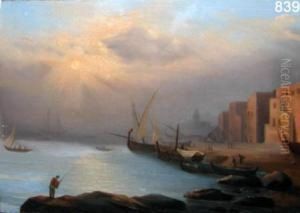G. Vernet Paintings
Claude-Joseph Vernet, born on August 14, 1714, in Avignon, France, is renowned for his prowess in painting landscapes and seascapes, embodying the French school's pre-eminence in the 18th century. His early exposure to art, guided by his father Antoine Vernet, a skilled decorative painter, laid the foundation for his illustrious career. Vernet's journey into the realms of art took a significant turn when he moved to Rome at the age of 20, where the majestic landscapes and marine settings of Italy profoundly influenced his artistic direction. It was here that he immersed himself in studying the works of classical and contemporary masters, which honed his skills and enriched his palette.
Vernet's reputation as an artist flourished in Italy, where he spent over twenty years of his career. His seascapes, in particular, captivated the attention of both patrons and critics, showcasing his exceptional ability to capture the mood of the sea and the beauty of the coast. His paintings were celebrated for their detailed realism, atmospheric effects, and the harmonious interplay of light and color, which brought the landscapes and seascapes to life. Vernet's influence was further bolstered by his inclusion in the French Academy in Rome, marking his official recognition and consolidation of his status as a leading artist of his time.
In 1753, Vernet returned to France, where his fame had preceded him. King Louis XV commissioned him to create a series of seaport paintings, which are considered among his finest works. These paintings not only showcased his mastery over marine landscapes but also reflected the French Enlightenment's interest in scientific observation and the natural world. Throughout his career, Vernet remained closely connected to the ideals of the Enlightenment, infusing his works with a sense of curiosity and a keen observation of nature.
Vernet's legacy extends beyond his maritime and landscape paintings. He was also a mentor to his son, Antoine Charles Horace Vernet, and his grandson, Émile Jean-Horace Vernet, both of whom became celebrated artists in their own right, continuing the family tradition. Claude-Joseph Vernet passed away on December 3, 1789, in Paris, leaving behind a body of work that continues to be admired for its beauty, technical skill, and emotional depth. His paintings are held in high regard and can be found in major museums and collections around the world, testament to his enduring contribution to the art of landscape and seascape painting.
